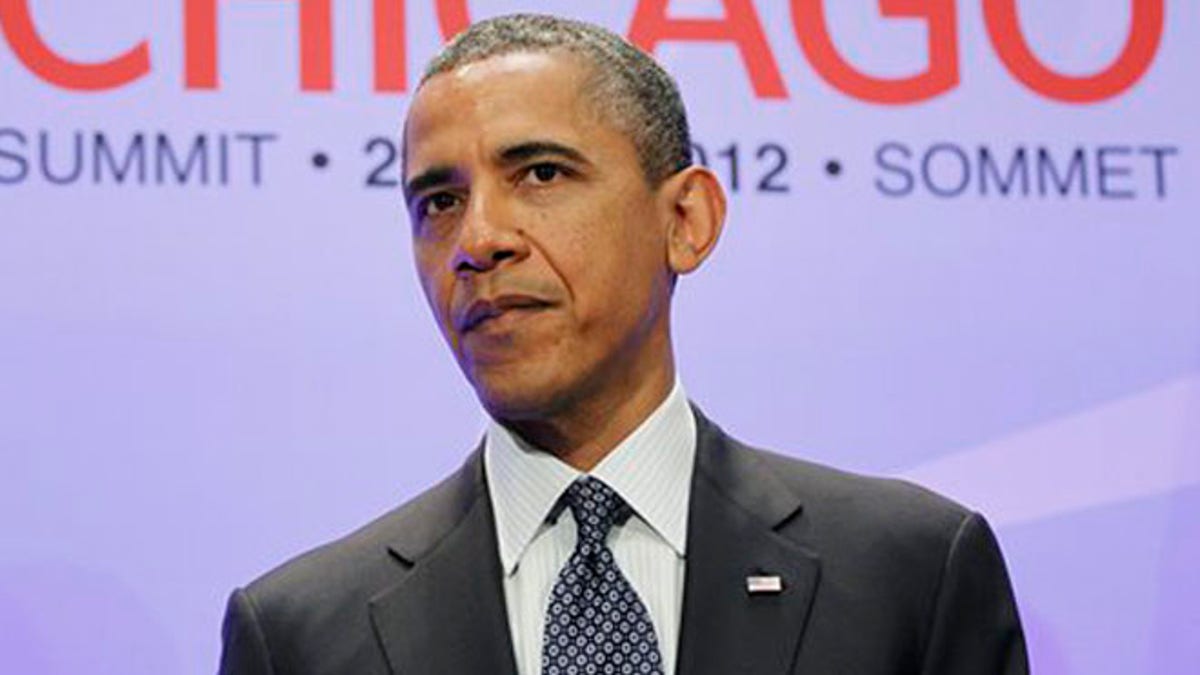
May 20, 2012: President Obama listens during a meeting on the sidelines of the NATO Summit in Chicago. (AP)
The news Monday that 43 different Catholic entities across the country are suing the Obama administration, in response to the Health and Human Services' (HHS) rule mandating employer health care coverage of contraception, abortion-inducing drugs, and sterilization, comes as a blow to the president's strength among Catholics, a demographic that helped carry him to victory in 2008.
This news comes on the heels of the the latest CBS News/New York Times poll which finds Mitt Romney now leading President Obama among women, yet another demographic that he previously commanded.
If Mr. Obama was hoping to once again rely on Catholics and women to help carry him to electoral success in 2012, it appears as though he is miscalculating.
A recent survey by the Pew Research Center shows that, despite the administration’s self-portrayal as the champion of “women’s issues” amidst a supposed Republican “war on women,” the president’s reelection advantage among women has declined in recent months as well as with another key demographic -- Catholics.
Obama was ahead among Catholics by 9 points in early March, and is now trailing by 5 points.
The Pew survey finds that, among Catholic voters with an opinion, 47% would today vote for President Obama, and 52% for former Massachusetts Governor Mitt Romney.
That same margin, were it to hold on Election Day, would mark a swing of 18 million voters away from Obama.
The loss of these Catholic votes alone would remake the 2008 electoral map, delivering Florida to Governor Romney and leaving the president no margin for error in Colorado or Ohio.
Women appear to be unimpressed by the Democratic strategy of alleging a “war on women,” with the president in the role of their defender. And that very strategy to turn women against Republicans has only served to alienate Catholic voters – including, of course, Catholic women.
The “war on women” narrative was a strategic shift, invented after polls revealed strong public support for exempting religious employers and charities from the heavy-handed HHS mandate.
The Obama administration no doubt knew it would lose some support with Catholics in the mandate. But they surely did not anticipate the strong and unified voice with which Catholic leaders, in particular bishops, responded even after the administration offered a compromise widely rejected as an accounting gimmick.
In the most comprehensive survey conducted on the issue yet, Washington-based public opinion firm QEV Analytics recently found that some 50% of regular churchgoing Catholics heard a statement during Mass setting forth the bishops’ serious misgivings about the insurance mandate. Of all the Catholics who heard this statement, most apparently agreed with it.
The administration likely gambled that minor losses with the Catholic vote would be more than compensated for by surging support from women, in particular young, single women. But the QEV findings indicate that this was a major miscalculation.
Even among women under age 45, the survey found that a majority – 54% – support the Church’s position that religious institutions should not be required to violate their own teachings.
Among women age 45 or older 58% felt the same; they question the wisdom of a mandate that would leave many faith-based charities no choice but to curtail their services to the needy, or close down altogether.
As for whether the government should single out birth control to be mandated and cost-free when so many other drugs are not, again a clear majority of women -- sixty-three percent -- say “no.” After all, is your mother’s blood pressure medication or your child’s asthma medicine free by federal decree?
When all of the QEV findings are added up, the mandate has yielded no advantage for the administration among the young female voters it was presumably targeting: only 17% of women under 45 say they are more likely to vote for Obama because of it, while 26% say they are less likely.
And among every other category of women, the issue turns out to be a loser, while also carrying a very tangible cost among Catholics: Twenty-nine percent say they are now less likely to vote for the president because of this issue, more than double the 13% who say it makes them more likely to support him.
For its part, reading only the approving editorials of the secular press, the Obama political team may view its election tactics with religious groups and women as working.
The administration will no doubt feel emboldened to assert yet more federal power over religious groups in a second term.
If the quickly changing sentiments among Catholics and women are any indicator of things to come, however, the administration is not going to get that chance.
Ashley McGuire is a Senior Fellow with The Catholic Association and the editor-in-chief of AltCatholicah.
